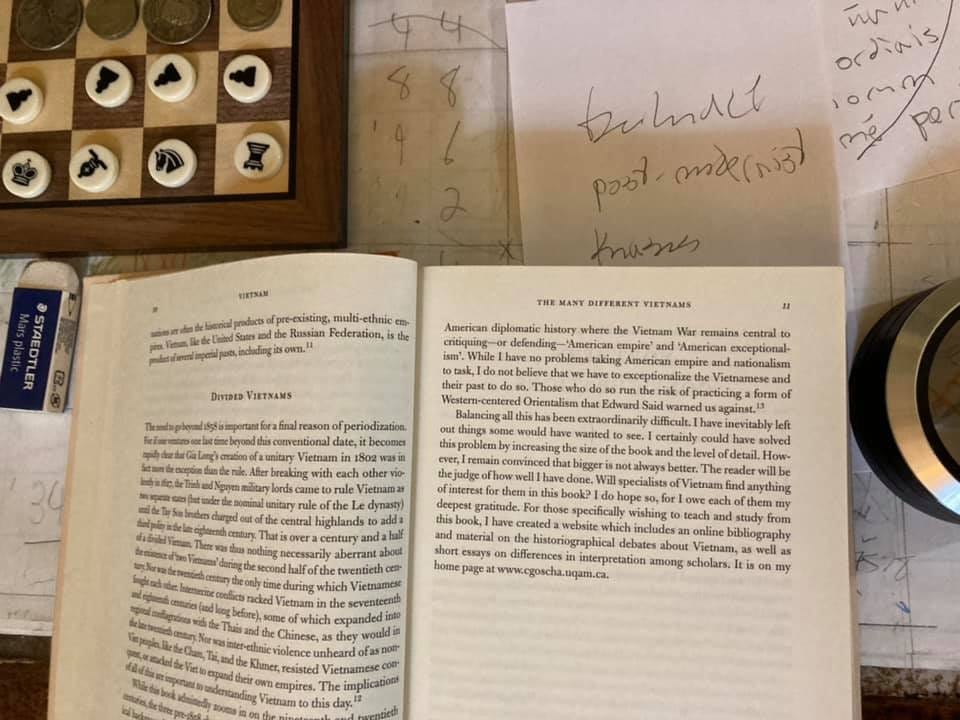Balancing all this has been extraordinarily difficult.
So begins the last paragraph of Divided Vietnams, the fourth and final section, following Imperial Vietnams, Modern Vietnams, and Multiple Vietnams,
where Christopher Goscha elaborates The Many Different Vietnams, the introduction to his Vietnam: a New History.
It is hard to keep your balance these days, I remember a high school classmate writing just after the fall of Saigon. Our teacher slashed an edit through the end of the sentence.
It is hard to keep your balance. The late author Nguyen Huy Thiep once told me his earliest memory was balancing in a basket on a stick over his mom's shoulders fleeing the French.
He returned to Ha Noi to train as an historian under our bombs then went out to teach his nation's and world history to the hill people who had supported the revolution. He came back in middle age and published a story about a hunter
who learns that a successful trip to the forest is when you walk out balancing on your own two legs. I remember balancing on the metro gazing into Chris' spectacles as
I hunted the Vietnamese and Orientalist books of Paris. He guided me that night to visit the author Georges Boudarel who had rallied to Viet Nam long before us, when in the revolution
he had worked with my Ha Noi friend the publisher Huu Ngoc. I had written to the French man once from the United States explaining that I did not have the money to publish his memoir of those days.
Chris led me that night to his Bouda at his rest home, as Chris later invited me to seminars where I met his friends the Trotskyist historians and the French customs man who wrote the history of French customs officials in Indochine. We all shared chatter of
our rummaging of Paris, attic of Viet Nam for the last 2 hundred years anyways. To me, Chris' history of the nation is that Viet Nam, the one where you attend to all the different peoples of the place,
who include us and our ilk. Post-modernist, you may say, well we get called that by great power theorists in their sports jackets who speak of that nation, and all nations, as rational actors who we could manipulate if only we got the game theory right.
Meanwhile, the post-modernists themselves in Paris and over here project the most Orientalist view of that nation and its neighbors possible, the other acting as one agent we must patronize.
Instead I propose that we spend some time, as long as it takes, one brief section at a time as this book comes up in my rota, to get to know Chris' Vietnams as his many friends have presented them to him.
Chris is from Kansas, son of a horse farm. I am a Connecticut Yankee working in North Carolina, where I wrote my doctoral thesis as the hired man on a horse farm.
He teaches Thiep's nation and world history in Quebec, still in French as he did in Paris. I am a heritage French speaker from deep France where my grandmere worked alongside Annamites until they all died of the 1918 flu.
His Kansas is of course bloody Kansas, where our civil war started, when my North Carolina joined the wrong side by a hair then lost. Chris is a complicated author,
as I am a complicated reader. This is a complicated world. Vietnam, Vietnam, Vietnam: read all about it!
This was the first Viet Nam letter of 6 so far addressing Vietnam: A New History by Christopher Goscha. The second went out May 18, 2022, the third on June 20, 2022, the fourth on August 20, 2022, the fifth on October 17, 2022, and the sixth on November 27, 2022.
Viet Nam letters respects the property of others under paragraph 107 of United States Code Title 17. If we asked for permission it wouldn’t be criticism. We explain our fair use at length in the letter of September 12, 2022.
The colophon of these Viet Nam letters, directly above, shows the janitor speaking with poet David A. Willson on a Veterans Day.






